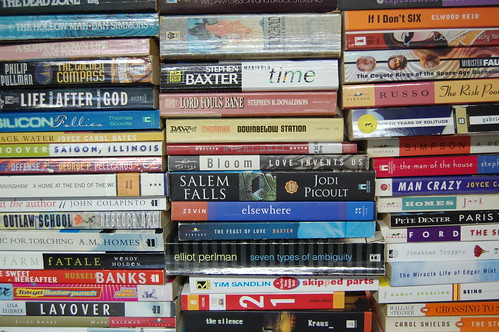Have you ever had one of those days that nothing goes according to plan? Yesterday, Kristen and I planned a quick trip to the Kroger Marketplace to spend the $130 "credit" we had earned for a special promotion. There were several problems with this:
 |
| Courtesy of Jason Brackins via Flickr |
- The nearest Kroger Marketplace store was 30 minutes away.
- There are only about 7 Kroger Marketplace locations in the Columbus area, while the number of Kroger stores offering holiday "credit" numbers over 50. The credit was redeemable only at the Marketplace locations.
- The time to redeem your credit was limited to 4 days.
- The types of items that you could use your credit on were limited. Mainly toys, housewares, clothing (although I didn't see any clothing at this particular location), some office supplies and some cleaning supplies.
- No price tags on any of the items, so if the item was removed from the shelf where the price was listed, you had no idea how much the item was.
- A stipulation that you had to spend ALL of the credit or you'd have to pay full price for the items you bought. For example, if I bought $129.85 worth of goods, the credit was no good and I'd waste it unless I found something else last minute to push it up over the $130 mark. And none of this information was communicated in a clear, meaningful way until you entered the store.
I have never seen shelves picked so clean. Not even during the last week of a going out of business sale. The store was trashed. Discarded items tossed everywhere. The lines for checking out were stretched to the back of the store and wound around the aisles. None of the scan-it-yourself bar code scanners worked, none of the items that qualified for the credit were marked, so you had to find a harried Kroger employee with a hand scanner and ask them to scan the items for you so you could add up what you spent so far as well as determine if the item was even eligible to be used for the program.
So our modest goals of picking up a new frying pan, a couple of nifty Christmas decorations and a few board games for the kids had to be abandoned. We bought exciting things like a cake server, basting brushes, some storage containers, a clock, a couple of card games, a sock drawer organizer... etc. Nothing that could be useful to give someone else as a gift or something that we really needed, but we didn't want to waste the credit since we were already in the store.
I get it. Companies want to attract customers with special programs around the holidays. They offer special deals but also count on the power of our (the customer's) laziness to offset the cost to the company for those special deals. We forget we have the credit. We forget about the date when you can redeem that credit. We don't take the time to read the fine print and show up to redeem the credit too late. This is why stores offer mail-in rebates. The stores get to offer a great deal, but the customer has to do some work to get that deal, and a lot of us don't do that. It's a win-win for the company. They graciously offer great deals, yet only take a hit on part of the cost.
But this one was clearly an epic fail. The customers weren't happy, the employees weren't happy and really got the worst job of trying to manage this poorly planned fiasco, while the brilliant marketing executive who came up with this gimmick was probably sleeping in on this sunny Saturday morning, oblivious of the hurricane that he unleashed for the Kroger employees and managers around the state.
We spent 3 hours at a store when we planned on a quick 30 minute trip to shop for a few things on our list and take it easy the rest of the day. No one in the checkout lines was smiling. None of the employees were either.With a little foresight, planning and communication of essential information, this could have been a good experience. Kroger failed.
What should you take away from this rant? Ideas are great. Ideas are wonderful. But if the idea has no organization to support it it will die, and in extreme cases like this one, it will maim you and others along with it.






